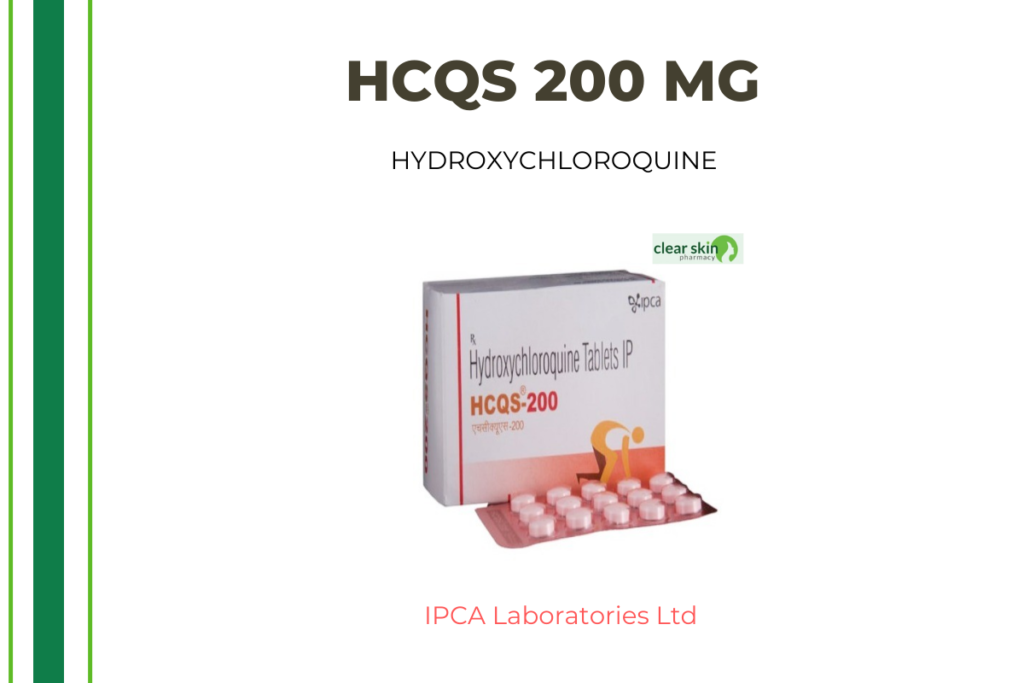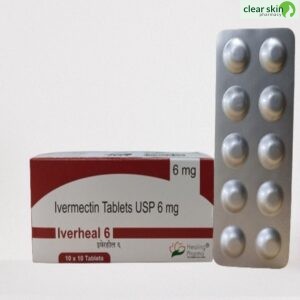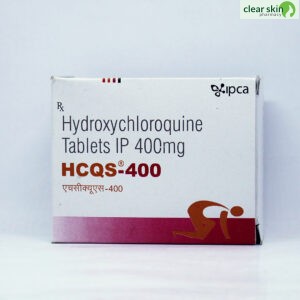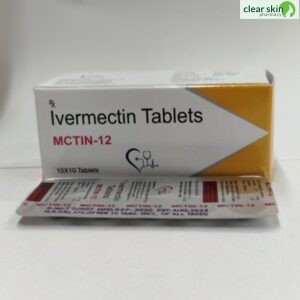HCQS 200 MG
Antimalarial medications, such as HCQS 200, are used to treat or prevent malaria. Malaria is a potentially lethal disease transmitted by the bite of a ‘Anopheles mosquito.’ When a healthy person is bitten by an infected mosquito, the ‘Plasmodium parasite’ is carried into the bloodstream, where it attacks red blood cells and liver cells, eventually causing them to rupture. Malaria is characterized by shivering chills, high fever, profuse sweating, headache, nausea, vomiting, stomach pain, diarrhea, anemia, muscle pain, convulsions, coma, and bloody stools. They often manifest 10 to 4 weeks following infection.
HCQS 200’s active component is hydroxychloroquine, which belongs to the medicinal class of quinolone drugs. It eliminates the parasite and blocks the production of the innocuous heme metabolite hemozoin. The parasite perishes due to the toxic byproducts produced during hemoglobin metabolism.
Take HCQS 200 exactly as prescribed by your doctor, at regular intervals throughout the day, for the best results. To prevent stomach upset, take this medication after a meal or with a glass of milk, or as prescribed by your physician. The dosage of HCQS 200 differs amongst patients dependent on their medical condition and the severity of their infection. A person utilizing HCQS 200 may have nausea, vomiting, hair loss, and itchy skin. However, not everyone is aware of these side effects, and some may not require medical attention. If side effects worsen or last for more than a few days, it is advisable to consult a physician.
Please inform your physician if you have any allergies (to any chloroquine salt) or if you have any medical conditions, including vision changes or retinal damage caused by anti-malaria medication, heart disease, heart rhythm disorder, diabetes, a stomach disorder, liver or kidney disease, psoriasis, alcoholism, porphyria (a genetic enzyme disorder that causes skin or nervous system symptoms), or glucose-6-p deficiency. Consult your physician if you are pregnant since it is unknown whether this medication might affect your unborn child. If suitable treatment is not administered at the appropriate time during pregnancy, the risk of miscarriage, stillbirth, premature delivery, and low birth weight may increase. Because HCQS 200 might enter breast milk, it is advisable to see a physician if you are breastfeeding.
Malaria is one of HCQS 200’s uses.
HCQS has also been reported to aid in the treatment of Coronavirus Covid-19, however this application is not FDA-approved.

Medicinal Advantages
HCQS 200 is an antimalarial medication. Antimalarials are used to treat or prevent malaria. HCQS 200 contains Hydroxychloroquine, a quinoline drug that inhibits the production of the innocuous heme metabolite hemozoin by the parasite. The parasite perishes due to its own harmful byproducts produced during hemoglobin metabolism. HCQS 200 is also used to treat rheumatoid arthritis, discoid or systemic lupus erythematosus, and discoid or systemic lupus erythematosus. HCQS 200 is ineffective against all strains of malaria.
Use Instructions
Follow your physician’s directions when taking HCQS 200. To lessen the risk of stomach upset, this medication should be taken after a meal or a glass of milk. It is neither to be eaten nor crushed.
Storage
Place in a cool, dry area out of direct sunlight.
Side Effects
Possible side effects of HCQS 200 include changes in eye color, blurring, sensitivity to light, skin rashes, itching, stomach pain, nausea, vomiting, diarrhea, loss of appetite, headache, and mood disturbances. The majority of adverse effects of chloroquine do not require medical treatment and resolve with time. However, if the bad effects persist, see a physician.
Drug Recommendations
Because HYDROXYCHLOROQUINE is ineffective against all varieties of malaria, see your physician if you have side effects after taking it. This therapy can be harmful to a patient’s heart, particularly if they are simultaneously taking antibiotic azithromycin. A person should consult a physician if they experience fast or thumping heartbeats and extreme dizziness. This medication should not be taken for a lengthy period of time, since it may cause irreversible eye damage, which may result in vision problems. Contraindications to using HYDROXYCHLOROQUINE include heart disease, heart rhythm disorder, diabetes, stomach disorder, quinine allergy, liver or kidney disease, psoriasis, alcoholism, porphyria (a genetic enzyme disorder that causes skin or nervous system symptoms), and glucose-6-phosphate dehydrogenase (G6PD) deficiency. If you are pregnant or breastfeeding, see your doctor before taking this medication, as it can only be prescribed by a physician.
Interactions Between Drugs
Some medicines, such as tricyclic antidepressants (amitriptyline), antirheumatic pharmaceuticals (leflunomide), and narcotic analgesics, may interact with HYDROXYCHLOROQUINE and produce substantial side effects (tramadol).
While using HYDROXYCHLOROQUINE, you should limit your consumption of grapefruit and grapefruit juice, since they can dramatically boost blood levels.
HYDROXYCHLOROQUINE is contraindicated in patients with oculotoxicity, porphyria, arrhythmias, bone marrow suppression, ototoxicity, seizures, glucose-6-pd deficiency, hepatotoxicity, myasthenia gravis, psoriasis, diabetes, cardiovascular disease, and renal impairment.
Safety Suggestions
ALCOHOL
Due to its potential for exacerbating adverse effects, alcohol use should be limited.
PREGNANCY
During pregnancy, HYDROXYCHLOROQUINE should be used with caution and only on the advice of a physician.
BREAST FEEDING
It is not suggested to breastfeed while using HYDROXYCHLOROQUINE since the medicine may pass into breast milk.
DRIVING
Because HYDROXYCHLOROQUINE may impair eyesight, it is prudent to avoid driving and other activities requiring mental clarity.
LIVER
In healthy individuals, chloroquine treatment is not expected to cause liver damage, but in rare instances, it can precipitate a sudden worsening of porphyria. If any contact occurs, a trip to the doctor is advised.
KIDNEY
In few instances, chloroquine treatment might impair kidney function, prompting medical advice.
No habit formation
Advice on Diet and Lifestyle
When a person has malarial fever, their body’s need for nutrition increases, and a high-carbohydrate diet together with fresh fruits and vegetables can help the body recover rapidly.
A person with a fever may have appetite loss, making eating difficult. To combat this, restore the body’s fluid requirements with glucose water, fresh fruit juices, and coconut water.
Malaria fever weakens the body and reduces its appetite, which helps it manufacture immune cells and fight parasites.
Due to the fact that the body is already mending and attempting to digest these complex meals, high-fiber foods, such as green leafy vegetables and fruits with thick skin, should be avoided.
Rest sufficiently to allow the body to relax and mend itself more rapidly.
Recommendations
Blood smears and other diagnostic procedures can identify malaria.
Additional Information: This item is non-refundable.
Glossary of Diseases and Conditions
Malaria is a potentially fatal disease caused by parasites that enter the body through a mosquito bite. This is a prevalent condition in Africa, South America, and Asia. When an infected mosquito (infested with the parasite Plasmodium; parasites are organisms that live in other organisms for survival) bites a healthy person, the parasite enters the circulation and begins to multiply and harm the red blood cells of the body. Four parasites produce malaria: Plasmodium vivax, Plasmodium ovale, Plasmodium malariae, and Plasmodium falciparum. 10 to 4 weeks after being bitten by a mosquito, infected individuals often have the following symptoms: shivering chills, moderate to high fever, profuse perspiration, headache, nausea, vomiting, stomach pain, diarrhea, anemia, muscle pain, convulsions, coma, and bloody feces.
FAQs
If a person is taking a therapy for diarrhea, they should wait at least four hours before or after taking HYDROXYCHLOROQUINE, since the two medications may interact and prevent the drug from being absorbed efficiently by the body.
It has been noted that prolonged use of HYDROXYCHLOROQUINE may cause irreversible damage to the retina of the eye, resulting to vision loss; thus, use this medication only for the duration prescribed by your doctor.
This drug should not be administered to patients with G6PD deficiency since it raises the risk of hemolysis. Before taking it, consult your physician.
It is not advised to provide HYDROXYCHLOROQUINE to those who are presently taking an antibiotic (azithromycin) since it might affect the heart.







Be the first to review “HCQS 200MG 10 tablets”